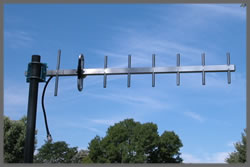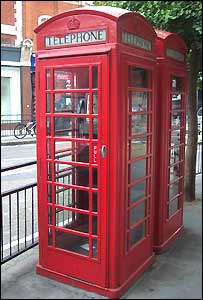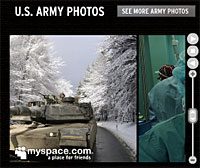There’s a scramble for US spectrum by a collection of big-time venture capitalists.
 In the same way that UK frequencies are being freed up by analogue TV going digital, a big chunk of valuable frequency will also be coming up for grabs in the US too. The big difference is that the US one is coming up a lot sooner, with the US government having mandated that their analogue switch off occurs on 19 Feb 2009.
In the same way that UK frequencies are being freed up by analogue TV going digital, a big chunk of valuable frequency will also be coming up for grabs in the US too. The big difference is that the US one is coming up a lot sooner, with the US government having mandated that their analogue switch off occurs on 19 Feb 2009.
Once freed-up, it is to reallocate the frequencies to public-safety organizations and commercial broadband networks.
According to the IHT, one of the contenders is a company called Frontline Wireless, which was formed at the start of this year to try to utilise the 700-megahertz band – by fulfilling both public-safety usage and commercial usage simultaneously.
A key part of their technical solution is the use of Software Defined Radio (SDR), which allows the same device to operate on many different frequencies, using the same chipset, switched by software.
 The 700-megahertz frequency is highly favoured as it has a significant capacity, good range and can easily penetrate buildings and other structures.
The 700-megahertz frequency is highly favoured as it has a significant capacity, good range and can easily penetrate buildings and other structures.
Frontline has a number of advantages on their side. Not only does it have Reed Hundt, a former Federal Communications Commission chairman acting as Vice Chairman, but the company’s first public investor was K. Ram Shriram, an early Google investor known for his investment acumen. Venture capitalists L. John Doerr and James Barksdale, originators of Netscape, have also jumped on board.
They plan to offer to the public-safety network free of charge, while monetising the commercial side of the network. It’s estimated that they’d spend over $8 billion building out the network.
 The report found that half of all UK adults live in broadband-connected households, up 11% from 12 months ago and a hefty seven times increase from 2002.
The report found that half of all UK adults live in broadband-connected households, up 11% from 12 months ago and a hefty seven times increase from 2002. Although just under half of users had no idea how fast they were connecting to the Internet, the report put the average headline connection speed at 3.8Mbps (up from 1.6Mbps in 2005).
Although just under half of users had no idea how fast they were connecting to the Internet, the report put the average headline connection speed at 3.8Mbps (up from 1.6Mbps in 2005). The idea behind the .xxx p0rn domain extension (or Top Level Domain TLD, in domain -ese) has been floating around for a
The idea behind the .xxx p0rn domain extension (or Top Level Domain TLD, in domain -ese) has been floating around for a 
 Ofcom have just announced a new regulatory code for Voice over Internet Protocol (VoIP) service providers operating in the UK.
Ofcom have just announced a new regulatory code for Voice over Internet Protocol (VoIP) service providers operating in the UK. Before June 2007, all VoIP providers will be required to make it clear :-
Before June 2007, all VoIP providers will be required to make it clear :- Ofcom has just announced that it will be carrying out an inquiry into the whole area.
Ofcom has just announced that it will be carrying out an inquiry into the whole area. The inquiry will be led by Richard Ayre, a former Deputy Chief Executive of BBC News. He is expected to receive extensive input from the premium rate services regulator, ICSTIS, who are already investigating a number of individual cases.
The inquiry will be led by Richard Ayre, a former Deputy Chief Executive of BBC News. He is expected to receive extensive input from the premium rate services regulator, ICSTIS, who are already investigating a number of individual cases. Despite a
Despite a  HDForAll are a pressure group made up of TV manufacturers, retailers and public service broadcasters including DSGI, Samsung, Sony and Toshiba and BBC, ITV, Channel 4 and Five. They’re keen to remind people that there’s only a limited amount of time left to contact Ofcom to make their views known on auctioning off spectrum to the highest bidder. Background on this and how to respond are available on
HDForAll are a pressure group made up of TV manufacturers, retailers and public service broadcasters including DSGI, Samsung, Sony and Toshiba and BBC, ITV, Channel 4 and Five. They’re keen to remind people that there’s only a limited amount of time left to contact Ofcom to make their views known on auctioning off spectrum to the highest bidder. Background on this and how to respond are available on  The quarterly report snappily titled, Communications Market: Digital Television Progress Report, covering the fourth quarter of 2006 (October-December), shows the figures are up from 39% in the same period the previous year, and also from 44.7% in the Q3 2006.
The quarterly report snappily titled, Communications Market: Digital Television Progress Report, covering the fourth quarter of 2006 (October-December), shows the figures are up from 39% in the same period the previous year, and also from 44.7% in the Q3 2006. BT is under a legal obligation to provide phone boxes up and down the length of the UK, which they claim numbers 63,795. BT say that 40,500 of these phone boxes are unprofitable.
BT is under a legal obligation to provide phone boxes up and down the length of the UK, which they claim numbers 63,795. BT say that 40,500 of these phone boxes are unprofitable. In the interview with German weekly magazine Focus, published today, she poses the following question, “”Do you think it’s fine that a CD plays in all CD players but that an iTunes song only plays in an iPod?” It’s followed by a couple of words that are going to make uncomfortable reading for Apple, “I don’t. Something has to change.”
In the interview with German weekly magazine Focus, published today, she poses the following question, “”Do you think it’s fine that a CD plays in all CD players but that an iTunes song only plays in an iPod?” It’s followed by a couple of words that are going to make uncomfortable reading for Apple, “I don’t. Something has to change.” This just feels wrong on just about every level we can think of, but in an attempt to reach out to Da Yoot, the US Army have created a slick and highly polished MySpace recruitment site.
This just feels wrong on just about every level we can think of, but in an attempt to reach out to Da Yoot, the US Army have created a slick and highly polished MySpace recruitment site. A warning next to the psychopathic-looking Sgt Star warns, “The information you enter is to be used only for recruiting Soldiers into the U.S. Army and the Army Reserve.”
A warning next to the psychopathic-looking Sgt Star warns, “The information you enter is to be used only for recruiting Soldiers into the U.S. Army and the Army Reserve.” We apologised: “OK. Sorry. We want to go to Iraq and bomb some soft Johnny Foreigners back into the Stone Age in the name of peace.”
We apologised: “OK. Sorry. We want to go to Iraq and bomb some soft Johnny Foreigners back into the Stone Age in the name of peace.” Clearly a sizeable wad of defence budget has been thrown at the slick game, which purports to offer realistic battlefield scenes (although we couldn’t find any options to rain friendly fire on Brit troops and then try and cover up the investigation afterwards.)
Clearly a sizeable wad of defence budget has been thrown at the slick game, which purports to offer realistic battlefield scenes (although we couldn’t find any options to rain friendly fire on Brit troops and then try and cover up the investigation afterwards.) Of course, there’s sound business reasoning behind the US Army shoving its shiny size nines onto a social networking site like MySpace, with the site able to interact with the community, make friends and receive comments and – possibly – make the Army look vaguely cool and enticing.
Of course, there’s sound business reasoning behind the US Army shoving its shiny size nines onto a social networking site like MySpace, with the site able to interact with the community, make friends and receive comments and – possibly – make the Army look vaguely cool and enticing.